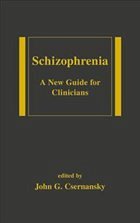Table of contents:
Part 11. Assessment and Diagnosis: Interviewing the Patient with Schizophrenia 2. Symptom Clusters in Schizophrenia 3. Differential Diagnosis of Schizophrenia 4. Cognitive Assessment in Schizophrenia Patients 5. Laboratory Tests to Aid in the Diagnosis of Schizophrenia Part 2 Treatment 6. Treatment of Acute Psychotic Episodes 7. Long-term Treatment of Schizophrenia 8. Management of Treatment-refractory Patients 9. Psychosocial and Cognitive Rehabilitation 10. Antipsychotic Drug Side Effects - Assessment, Treatment, and Prevention Part 3 Special Management Issues 11. Violence and Forensic Issues in Schizophrenia 12. Impact of Substance Abuse and Dependence on Patients with Schizophrenia 13. Family Education - a Guide for Developing a Programme 14. Schizophrenia From the Life Cycle Perspective
Contains guidelines and recommendations-in tabular form for quick reference-on patient evaluation and optimal treatment for long-term care!
Based on evidence from recent systematic clinical research studies, this comprehensive reference provides the latest information on the assessment, diagnosis, and treatment of schizophrenia-highlighting modern diagnostic tools and current therapeutic advances for the prevention of hallucinations, thought disorganization, and negative symptoms.
Emphasizes family education and psychoeducation, and community-centered treatments for patient rehabilitation and adherence to management programs!
With consideration of the chronic nature of the disease, Schizophrenia details
the effect of substance abuse and drug dependence on rehabilitation and treatment
second-generation antipsychotic drugs, including olanzapine, quetiapine, risperiodone, and ziprasidone
contemporary strategies to prevent depression and suicide
patterns of patient compliance and noncompliance
violence and forensic hospitalization
With over 600 useful references, Schizophrenia is an essential source for psychiatrists and psychopharmacologists, clinical neurologists and neuropsychopharmacologists, psychologists, primary care physicians, social workers, nurses, and graduate and medical school students in these disciplines.
Part 11. Assessment and Diagnosis: Interviewing the Patient with Schizophrenia 2. Symptom Clusters in Schizophrenia 3. Differential Diagnosis of Schizophrenia 4. Cognitive Assessment in Schizophrenia Patients 5. Laboratory Tests to Aid in the Diagnosis of Schizophrenia Part 2 Treatment 6. Treatment of Acute Psychotic Episodes 7. Long-term Treatment of Schizophrenia 8. Management of Treatment-refractory Patients 9. Psychosocial and Cognitive Rehabilitation 10. Antipsychotic Drug Side Effects - Assessment, Treatment, and Prevention Part 3 Special Management Issues 11. Violence and Forensic Issues in Schizophrenia 12. Impact of Substance Abuse and Dependence on Patients with Schizophrenia 13. Family Education - a Guide for Developing a Programme 14. Schizophrenia From the Life Cycle Perspective
Contains guidelines and recommendations-in tabular form for quick reference-on patient evaluation and optimal treatment for long-term care!
Based on evidence from recent systematic clinical research studies, this comprehensive reference provides the latest information on the assessment, diagnosis, and treatment of schizophrenia-highlighting modern diagnostic tools and current therapeutic advances for the prevention of hallucinations, thought disorganization, and negative symptoms.
Emphasizes family education and psychoeducation, and community-centered treatments for patient rehabilitation and adherence to management programs!
With consideration of the chronic nature of the disease, Schizophrenia details
the effect of substance abuse and drug dependence on rehabilitation and treatment
second-generation antipsychotic drugs, including olanzapine, quetiapine, risperiodone, and ziprasidone
contemporary strategies to prevent depression and suicide
patterns of patient compliance and noncompliance
violence and forensic hospitalization
With over 600 useful references, Schizophrenia is an essential source for psychiatrists and psychopharmacologists, clinical neurologists and neuropsychopharmacologists, psychologists, primary care physicians, social workers, nurses, and graduate and medical school students in these disciplines.

